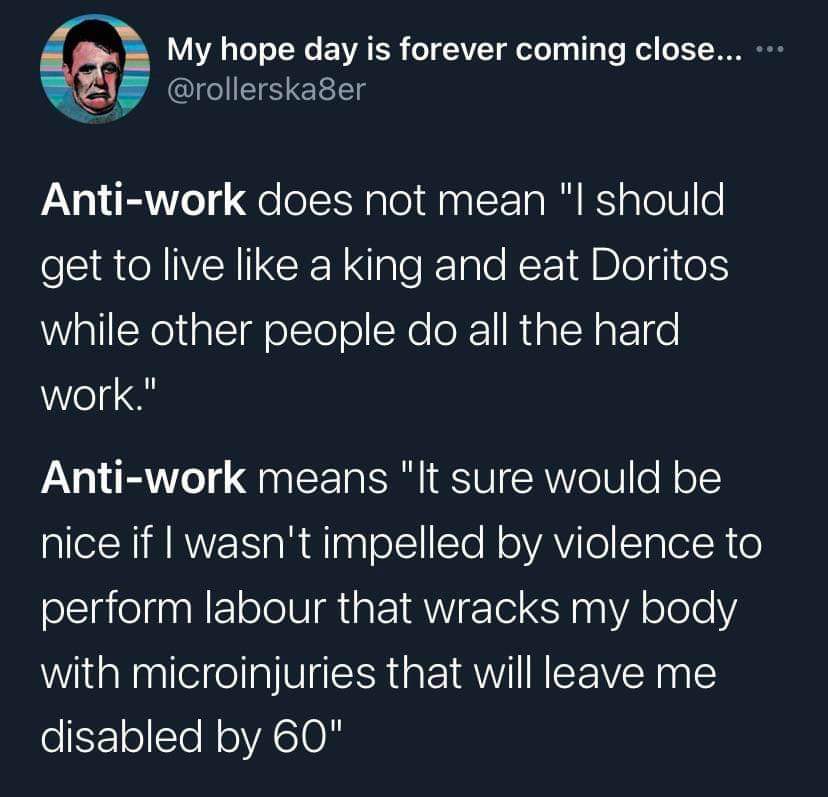this post was submitted on 21 May 2024
1007 points (95.3% liked)
Antiwork
8414 readers
6 users here now
-
We're trying to reduce the numbers of hours a person has to work.
-
We talk about the end of paid work being mandatory for survival.
Partnerships:
- Matrix/Element chatroom
- Discord (channel: #antiwork)
- IRC: #antiwork on IRCNow.org (i.e., connect to ircs://irc.ircnow.org and
/join #antiwork) - Your facebook group link here
- Your x link here
- lemmy.ca/c/antiwork
founded 3 years ago
MODERATORS
you are viewing a single comment's thread
view the rest of the comments
view the rest of the comments

Exactly! I have a genetic illness that caused congenital deformities and injuries and disability later in life, starting around my teens thanks to puberty.
From an early age my relationship with work was distorted because I found myself trapped in the gap between two pathways. I was obviously capable of work, with the right treatment and support I had a lot of potential. But I was disabled, and I required expensive supports and medical intervention, and under the public healthcare system there reaches a point of disability and limitations in capacity that you are written off by the system. Shoved in a residential group home, given a pension below the poverty line, and expected not to try. (genuinely, we're expected not to try, if someone on a disability pension works a job, they can loose their pension, which is many cases is also tied to housing and access to medical services)
I'd flip between the two systems, I'd have a great few months with regular access to treatment, I'd get a job plan from the dole office, I'd sit through work readiness courses, I'd be getting healthier and looking forward to working and being a good little contributor to society. Then I'd hit a waiting list for my medical care, my health would slip, I'd be re-assessed by the welfare department and deemed too disabled to work, my job plan would be shredded and I'd get a pension support plan. Then I'd get to the top of the wait list, resume treatment, and get back to getting to work.
I didn't start a "real job" until I was 24, it was a call centre gig and I near killed myself trying to do it.
It wasn't even hard. It was a true 9-5 (no overtime, no bullshit) and you mentally didn't need to bring any of it home with you. It was easy for me, but my body decided it was too much. My health suffered and it took years to fully recover, with me barely pulling myself together here and there for gig work in between being bounced on and off the disability pension system.
The whole endeavour was far more expensive to tax payers than a system like UBI. Processing my case 70 times because the disability support, and employment support eligibility requirements are so strict and the lines between streams so black and white took a lot of administrative resources.
I've been in my current industry for 10 years this November. I work part time, 12-20 hours a week depending on my health. I'm highly successful in my field because I'm working within my body and mind's means and playing to my strengths. I'm a whole person with a life outside work and I bring that range of experiences to my job, enriching what I bring to my organisation - which is good, because my job is a mutual exchange between me and my employer, it's not exploitive towards me the worker, which further prevents burn out for me.
But we exist within the capitalist system of funding and our wages are set by the department of health and human services. I make $34,000AUD a year and it's not enough to survive.
But if I work any harder my body will not survive.
I'm asking to do what I can do for my community, while living a safe existence.... Not being forced to choose between litteraly breaking my back working for someone else's greedy profit, or starving in a tent (though realistically, a lot of people are doing both)